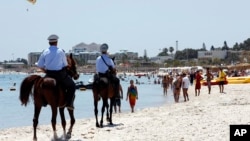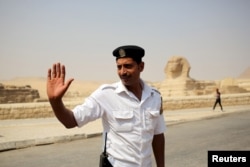Since an Islamic extremist gunned down holiday-makers in June in Tunisia, Western governments have been issuing warnings urging their nationals to exercise heightened caution when traveling to North Africa and the Middle East or better still, to stay away altogether.
From Tunisia in the west to Turkey in the east, tourism is having an awful year with European and American visitors heeding the terror warnings.
Last month the State Department upheld a global travel warning for Americans because of “the continuing threat of terrorist actions and violence against U.S. citizens and interests throughout the world.”
The British and Danish governments also urged their nationals to flee Tunisia because of inadequate protection, prompting the country’s politicians to argue the Europeans are playing into the hands of the terrorists.
This is what the Islamic extremists want, they say.
“By damaging tourism, by having foreigners leaving the country, they damage the whole sector and put so many people out of work and on the streets,” Nabil Ammar, Tunisia’s ambassador in London, told the BBC recently. “Hotels have to close and this is an important industry. One of the sources of terrorism is lack of hope. It is not the only motor of it, but it is one of the very important origins.”
Meanwhile, in an apparent exercise in mockery, propagandists from the Islamic State group this week issued an online travel brochure touting their self-styled caliphate straddling Syria and Iraq as a great vacation spot able to offer crystal clear spring waters, Olympic size swimming pools, pastoral landscapes, beekeeping and fishing.
Egypt
In Egypt, a Sinai-based jihadi group aligned with ISIL has grown increasingly proficient in carrying out attacks and sophisticated in selecting targets based on their “strategic value.”
In June, a suicide bomber blew himself up near the ancient Egyptian Karnak Temple in the southern city of Luxor.
Egyptian authorities have eagerly been talking up the robustness of their tourism industry. Tourism Minister Khaled Ramy has announced a 3.1 percent revenue increase the first half of this year compared to the same period last year.
But compared to before the so-called Arab Spring, Egypt has seen a 95 percent slump in revenue from its cultural heritage sites in Cairo and Luxor. Most tourists are heading to the better-protected Red Sea resorts.
Egyptian authorities estimate in 2015 the country may host around 12 million tourists, well below the 2010 peak year of 14.7 million.
An increasing number of tourists this year will be from Russia and Asian countries. Egypt is aggressively marketing to China. Since 2000, external Chinese tourism has jumped from 13 million a year to 165 million and the number of Chinese visitors to Egypt is expected to double from the pre-revolution level of 100,000.
Jordan
In Jordan, the picture also shows historic lows in the number of tourists and revenue, despite the fact the last terror attack in the country was in 2005 when suicide bombers killed 60 people in three of the capital's hotels.
Revenue from tourism was down 15 percent during the first four months of 2015 compared to the same period last year, falling to $1.5 billion. For the Hashemite kingdom, which has no shortage of acclaimed wonders, the revenue drop is a serious setback. Tourism traditionally accounts for 15 percent of Jordan's gross domestic product.
What was once a flow of tourists to Petra and other sites has turned into a trickle with souvenir shop owners complaining they might not see a customer for days at a time. Ten hotels in Petra have had to close. Since 2010 the number of visitors to the site has halved.
"The threat of terrorism remains high in Jordan," says the U.S. State Department's current travel advisory for Jordan. That has prompted the country’stourism minister to complain recently: "It shouldn't be us who pays the price ... [Jordan] is not part of the problem in the region.” But for tourists who want safety first, vacations can’t be political expressions.
Britain's warnings
British officials say their decision to call Tunisia too dangerous for their nationals to holiday in didn’t come lightly. Immediately following the shooting that left 30 British vacationers dead in June in Sousse, Britain held back from issuing a "clear-out" warning.
But with signs more attacks could easily be launched, the government felt it had no alternative. “We understand the Tunisian complaints about our alert, but in the end our responsibility is to our nationals,” a senior British official told VOA.
Like Egypt, Jordan is looking for new tourist markets, including Japan and South Korea. And officials are exploring boosting medical tourism. In 2014, 250,000 foreign patients were treated in the country.
But the main booster for tourism will come when the threat of terrorism goes away.






